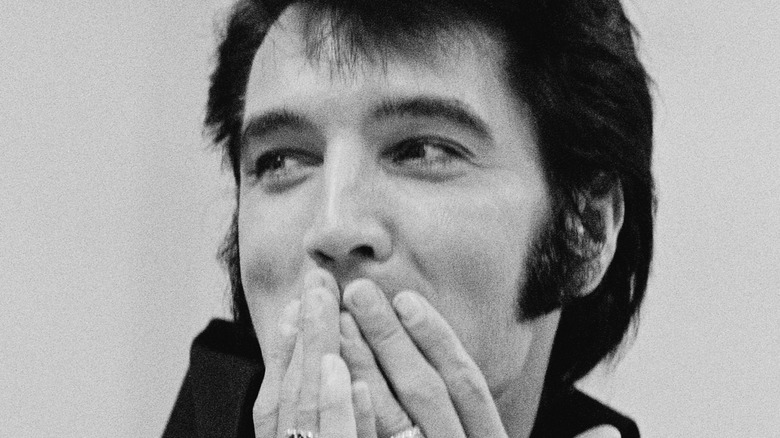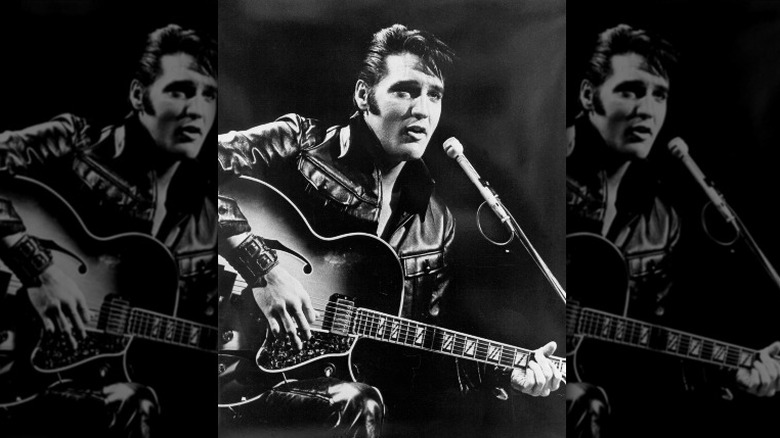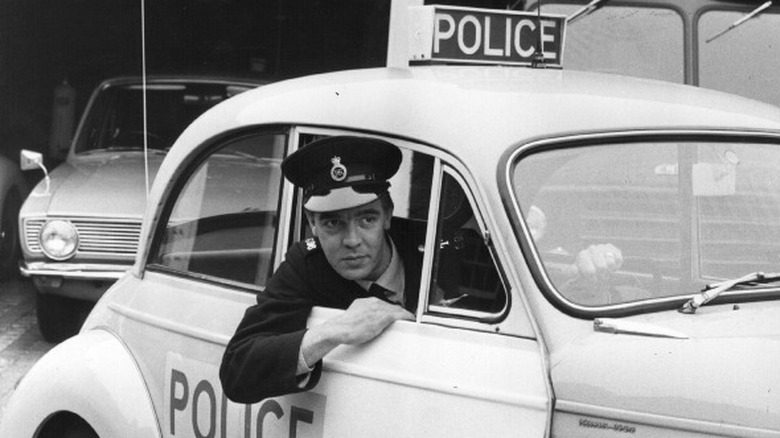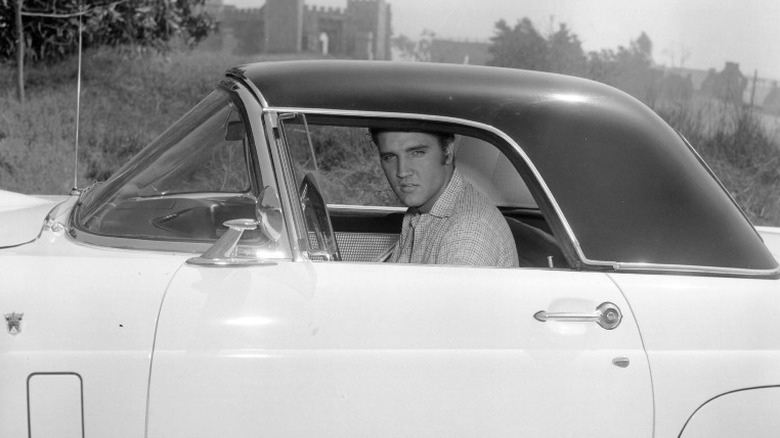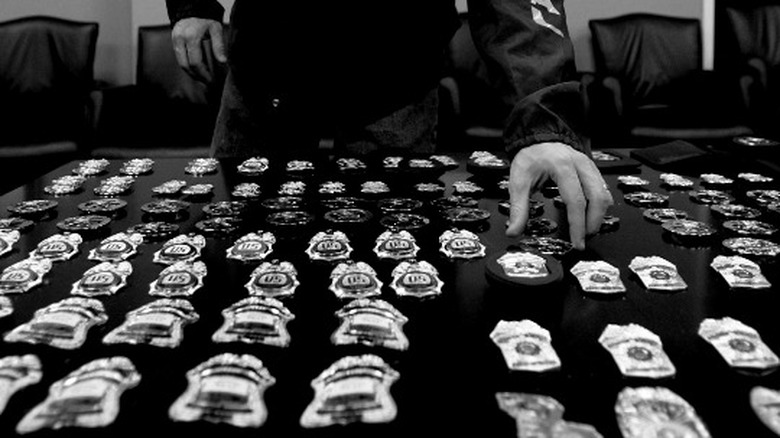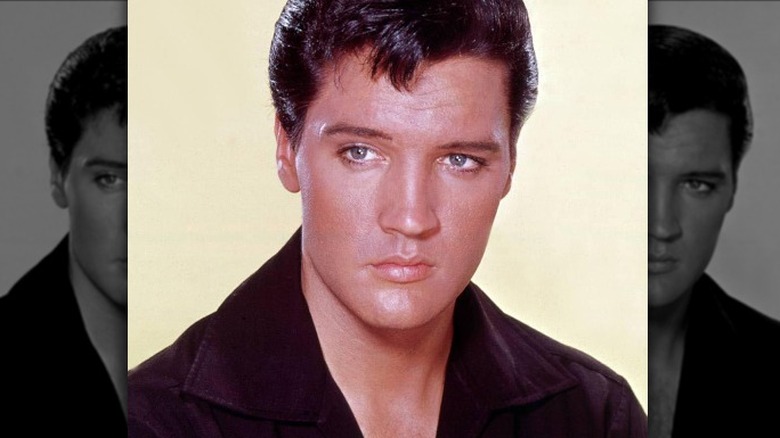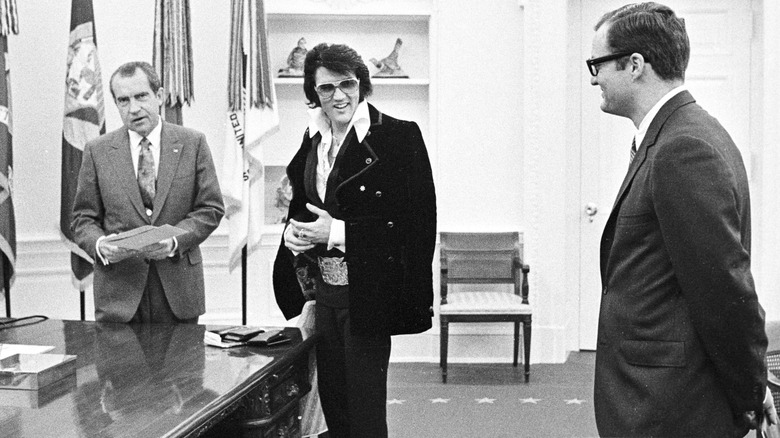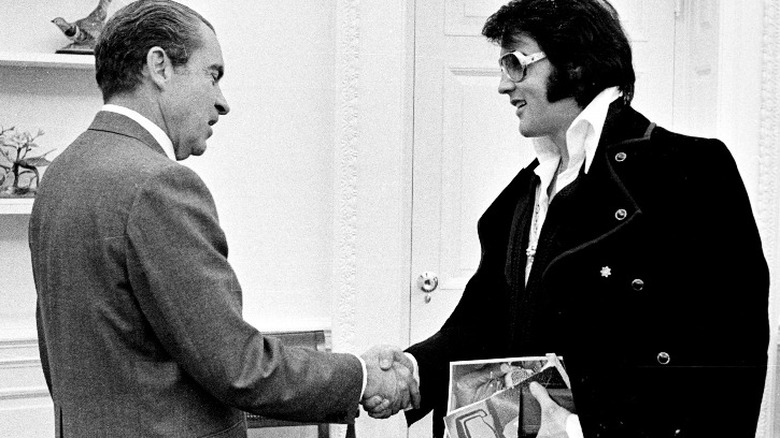Inside Elvis Presley's Interesting Relationship With Law Enforcement
It's not exactly rare to dream of being a famous rock star. But rock-and-roll icon Elvis Presley didn't write that down for career day in kindergarten class. The young Elvis Aaron Presley wanted to be a police officer. That's right: Elvis loved the police. He was a lifelong admirer of police officers — both as individuals and in the social function they serve. Perhaps strange for a self-styled renegade dream boy, but not to Elvis, apparently.
So passionate was his obsession that Elvis made it more of an active lifestyle choice than a personal affinity. Elvis loved the police with an obsession bordering on the strange.
After Elvis Presley became the King, he then became a cop — sort of. Elvis Presley was a police officer the way that Patrick Stewart is a "Knight Bachelor and Officer of the Order of the British Empire" (which he apparently is, according to Entertainment Weekly), although one of the two titles sounds a fair bit cooler than the other. The actor who plays Jean-Luc Picard in "Star Trek" is no more nobility than our pop-culture icon had qualified immunity.
American heartthrob? Or Officer Presley?
The former Deputy Chief of the Denver Police Department, Robert Cantwell, was pretty tight with Elvis. In 1982, Cantwell wrote about his old friend — who had died five years earlier, in 1977 — in his memoir biography, "The Elvis Presley I Knew." Colorado Public Radio (CPR) spoke to Cantwell on "Colorado Matters" and got the story of how the Elvis Presley he knew — unlike the one we thought we knew — became a cop.
According to Cantwell, Elvis didn't (technically). But that didn't stop Elvis from dressing like one — according to Cantwell on CPR, Presley somehow purchased his own Denver police uniform and had Cantwell photograph him in full officer getup. (There's a photo of Elvis in police togs on the cover of Cantwell's book.) Cantwell, who was noticeably fond of the internationally-famous rock-and-roll star, was clearly a willing party.
"Off the stage he was a different Elvis," Cantwell said. Elvis once confided in him about his hopes and dreams: "He always thought he would become a police officer, but these were his words, 'God blessed him with a voice.'" (The plight of a young man, right?)
Elvis patrolled Denver, bought Cadillacs, and was good at small talk
The fact that Elvis was not legally a Denver police officer didn't stop him from acting like one, however. His antics included an alleged recurring bit in which Elvis, fully-uniformed, conducted farcical traffic stops that always ended with his signature "Thank you, thank you very much." It soon became the stuff of local legend.
The singer's other legendary qualities — most notably his chart-topping ballads and his manic popularity — tend to have overshadowed the finer details of the man's psychological obscurities and fixations, including his hero-worship of 1950s, '60s, and '70s police departments. The situation was nonetheless extreme. According to the Graceland blog, apparently he even kept a rotund blue light in his Lincoln Mark IV, where it often sat fixed on the top of the vehicle flashing like a blue police cruiser light: reportedly, that meant Elvis was on his way to a crime scene — which he was, often, actually, and somehow even occasionally arrived there before the actual police department.
Agent, officer, captain, Mr. Presley: Elvis' Big Box of Badges
Cantwell and the other officers of the Denver Police Department didn't mind; after all, Elvis was a movie star and they liked him. He had a lifelong history of befriending police and firefighters. Jim Hammers, a Memphis Police officer, could vouch for this on his own terrain: "I don't care where he was, whenever he saw the police, Elvis always stopped and talked to them," he said in Graceland. This is generally considered poor legal advice, but Elvis enjoyed talking to the police at any given opportunity. He saw something of himself in police officers.
Those friendships may have been worth little more than kinship to the firefighters Graceland says he befriended as a child, but as a budding young rock star, they meant Cadillacs and the friendship of an international heartthrob. (Cantwell maintains that he accepted a Cadillac from Elvis only grudgingly, according to CPR.)
The Denver Police Department named Elvis Presley an honorary police captain, according to Smithsonian. He even had no less than two Denver police badges that he'd reportedly flash at other civilians while out on his Elvis Patrol. The badges were their own story.
After achieving the rank of Denver Police Captain, Elvis goes for a promotion
Elvis' lifelong fascination with police was well-documented. He kept that documentation himself in the form of a carefully-curated index of police department badges.
While being an honorary police captain of a city in which one does not live might be enough for most young boys with that particular fixation, it was not enough for the international sensation and rock-and-roll King Elvis Presley. He didn't just want to be king — he wanted to be czar. That's right: The year was 1970 and Richard Nixon had just launched his so-called "War on Drugs" that birthed the modern terror of mass incarceration. Yes, Elvis Presley wanted to be the drug czar of every little boy's dreams. And how does one do that? Of course, one must obtain the token: a badge emblazoned with the logo of the Bureau of Narcotics and Dangerous Drugs (later absorbed into the Drug Enforcement Agency).
Businesswoman Priscilla Presley wrote of her ex-husband's obsession in her memoir "Elvis and Me" (via Smithsonian): "The narc badge represented some kind of ultimate power to him," she wrote, giving the impression that she must have heard much about it from Elvis. "With the federal narcotics badge, he [believed he] could legally enter any country both wearing guns and carrying any drugs he wished."
'I Will Be Here As Long As It Takes'
Elvis Aaron Presley, of course, wrote to the president. After a frenetic back-and-forth exchange at airports in Los Angeles and Washington, D.C., with little in the way of destination but the meandering locus of the singer's internal discontent at a family dispute, he decided it was time to broach the topic with President Richard Nixon, the grand czar of czars of the drug war himself, the man who could bring the King into the hallowed halls of law and order immemorial. Naturally, Elvis addressed him as "sir." He offered his service to his country: "Sir, I can and will be of any service that I can to help the country out. I would love to meet you," Elvis wrote in his urgent missive. According to Smithsonian and Elvis's former aide Jerry Schlling, Elvis and Schilling were to stay at a Washington hotel under Elvis's alias.
Elvis informed the president of such matters, then got back to business. "I will be here for as long as it takes to get the credentials of a federal agent," he wrote.
The President, the King, and those dirty hippies
In the end, he did. Elvis was ushered in to the Oval Office to meet the Master Cop himself: Richard Nixon, president of the United States. (Smithsonian calls the meeting a "Nixon-Presley summit," a fitting term for such a gravely sober meeting of dispensation.) Nixon, however, was not in a sober mood at all. Like Robert Cantwell of the Denver Police, even President Richard Nixon was not immune to the infectious charm of the King of Rock-and-Roll.
According to Nixon's former aide Egil "Bud" Krogh (via Smithsonian), the two immediately commenced with a firm handshake — King to czar — and then began to discuss the enemy, as all great rulers do. Elvis expressed solidarity with Nixon's fight against the great forces of tomfoolery and redness, assuring him it was a concern he shared. According to Krogh, Elvis told the president that he was not a fan of the Beatles. Elvis brought the president a gun as a perhaps symbolic gesture of their mutual petty medium: the gun was a Colt .45 in a display case. Elvis found it imperative to display his current inventory of police badges for the president — credibility, of course.
Enlisting in the war on drugs?
Nixon, according to Krogh, met the King's remarks on popular culture with a gruff comment that "those who use drugs are also those in the vanguard of anti-American protest," as he phrased it. Elvis Presley, Denver Police Captain and King of Rock-and-Roll, looked the president in the eye and assured him what the world's most powerful Navy and a briefcase with a nuclear button could never assure him his whole life long: "I'm on your side," said Elvis Presley (via Smithsonian).
Elvis Presley left the White House that day in a purple suit with a badge for the Bureau of Narcotics and Dangerous Drugs. He was Elvis Presley. He was the United States of America. He had given Richard Nixon a hug.
Elvis Presley died in 1977. Richard Nixon, facing impeachment, resigned from the presidency. Chief Robert Cantwell, soon to retire and write his memoir (via CPR), traveled to Graceland to visit his friend. The King lay in state. Cantwell knelt at the casket.
